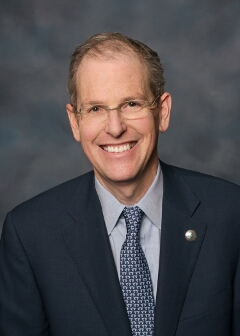
An almost decade long saga may end this year if the latest effort to reform New Mexico’s unconstitutional campaign reporting act makes it to the governor’s desk. Senate Bill 3, sponsored by Democratic Sen. Majority Leader Peter Wirth of Santa Fe, would increase public disclosure of money spent to influence elections by requiring certain groups not covered by the act now to begin reporting their political spending. The bill also raises campaign contribution limits.
The bill passed the Senate today easily, with only Democratic Sen. Jeff Steinborn and Republican senators Craig Brandt, Pat Woods, Bill Sharer, Cliff Pirtle, and Mark Moores voting against it, and now heads to the House. A similar bill passed the Legislature in 2017 but was vetoed by former governor Susana Martinez.
New Mexico Secretary of State Maggie Toulouse Oliver issued a rule two years ago that implemented similar requirements as those in SB 3, but that rule was challenged in court right after the November 2018 election. Groups reported spending during the general election well north of $1,000,000 on advertising that would not have been reported without the rule she put in place.
Wirth’s bill would make permanent reporting similar to that implemented by Toulouse Oliver, by placing the requirements in state statute.
The reform effort started in 2011 after a federal court found requirements in New Mexico’s current statute about who had to file political reports unconstitutional because they were too broad. At the same time other federal courts had lifted restrictions on political spending so long as the spenders weren’t coordinating their political advertising with a candidate or political committee, in what are called independent expenditures.
Wirth’s bill defines what constitutes an independent expenditure and sets up requirements to report that spending, clarifying when advertising by nonprofits, individuals, or other groups qualifies as an independent expenditure and must be reported.
Basically, anyone who spends more than $1,000 in a non-statewide election or $3,000 in a statewide election on political advertising without coordinating with a candidate or political committee has made an independent expenditure, and would have to file a report with the Secretary of State.
It defines political advertising as ads that either urge voting for or against a candidate or ballot measure, or that refer to a candidate or ballot measure within 30 days before a primary or 60 days before a general election.
Wirth’s bill also raises contribution limits for non-statewide candidates, from $2,300 to $5,000 per election period, bringing legislators equal to candidates for statewide offices.
Sen. Stuart Ingle, R-Portales, made an argument in favor of the increases, saying Senate candidates need more money to run their campaigns. Ingle has long been a critic of campaign contribution limits in the first place, arguing they simply push money to the control of political committees, rather than the candidates themselves.
“This puts it on a more even scale than we’ve had it,” he said.
But Steinborn spoke up against raising the limits, which prevented him from supporting the bill, he said. Before limits were put into place in 2009, he said, the incredibly large donations made to candidates were like the wild west. “It was always shocking when that happened,” he said, “…I’d rather not go in that direction.”
Wirth said in closing that he found it frustrating as well, but in light of changes at the federal level that allow unlimited independent political spending, “the rules have changed.”
